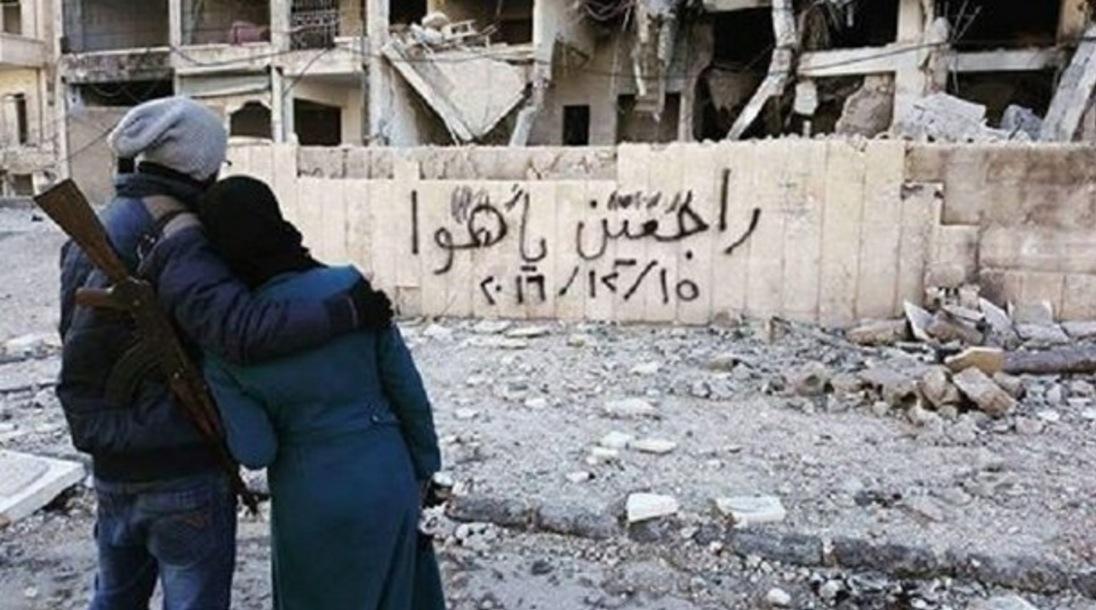These people risked everything to tell the story of Aleppo. Here's what happens to them now
Civilian activists must now make the choice to abandon the revolution they have fought for over five years or contemplate the horrors of the regime’s prisons

Your support helps us to tell the story
From reproductive rights to climate change to Big Tech, The Independent is on the ground when the story is developing. Whether it's investigating the financials of Elon Musk's pro-Trump PAC or producing our latest documentary, 'The A Word', which shines a light on the American women fighting for reproductive rights, we know how important it is to parse out the facts from the messaging.
At such a critical moment in US history, we need reporters on the ground. Your donation allows us to keep sending journalists to speak to both sides of the story.
The Independent is trusted by Americans across the entire political spectrum. And unlike many other quality news outlets, we choose not to lock Americans out of our reporting and analysis with paywalls. We believe quality journalism should be available to everyone, paid for by those who can afford it.
Your support makes all the difference.President Bashar al-Assad has appeared on Syrian state television to address the citizens of Aleppo on the “liberation” of the city.
“History is being made” now that the terrorist insurgency has been defeated, he said, adding the victory was “bigger than the word ‘congratulations.’”
A convoy of government buses carrying around 200 civilians and fighters left the siege barricades for neighbouring Idlib province on Thursday after a fragile second ceasefire deal struck late on Wednesday held up. The slow pace means the planned evacuation of 5,000 people could take days.
It is unclear how many are left in the last tiny slivers of rebel territory in east Aleppo.
For the civilian revolutionaries who for four years defied the regime from what was once their biggest stronghold, uncertainty awaits.
"We are giving only two deadly choices: Death or displacement. both of them are heartbreaking," English teacher Abdulkafi Alhamdo tweeted at dawn on Thursday, along with a picture of the sun rising which he called "The last light of freedom in Aleppo."
In the past few days, non-combatant activists, among them teachers like Abdulkafi, accountants, doctors and nurses who keep journalists informed on what’s happening inside the city’s siege barricades have sent increasingly fearful messages as the reality of what awaits them once the government fully retakes the city sets in.
“Anyone who knows anything about the Assad regime should know what to expect. Death will be a wish for those captured and deemed [to be] opposition, weather [sic] military or civil,” one wrote in a WhatsApp message.
Many people have destroyed identifying papers, deleted social media accounts or thrown away phones - including, briefly, Fatemeh Alabed, who temporarily deactivated her seven-year-old daughter Bana’s Twitter account, which has gathered a worldwide following since it was set up in September.
The Independent could not reach Fatemeh, but another activist confirmed that the family were still in east Aleppo, and were safe as of Wednesday, although their house had been destroyed and Bana's father injured in shelling.
Men who have either fled to or ended up in areas under regime control as the front line rapidly moves have been conscripted and forced to fight against their former friends and allies.
Worse still, around 6,000 men and boys who have crossed into government or Kurdish controlled territory in the past month have been detained and disappeared, the UN says. Their whereabouts are still unknown.
An August report from Amnesty International estimated that 18,000 people have been tortured and died in regime prisons since the beginning of the war in 2011. Thousands more remain unaccounted for.
Rather than wait for the army or secret police to knock at his door, White Helmets volunteer Ibrahim Abu Laith decided to leave the city which has been home his entire life. “What is happening here has never happened anywhere, it is a mix of the best of humanity and the worst,” he wrote. “Leaving Aleppo will be the hardest thing I have ever done.”
As the evacuations continue, one well-known activist said he would stay in east Aleppo as long as he could.
“I’m happy I could make it to this moment and stay to the end. It was not easy at all,” he said in a Whatsapp voice message, adding that he was glad his family was still together and safe after four years of fighting.
A lot of families have already been split up. Civilians and fighters who helped their wives and children get to regime or Kurdish controlled areas in the past two weeks to avoid further fighting hope they can be reunited in Idlib, the evacuees’ destination.
The countryside of Idlib is not necessarily safer than the city they left, however: it has been subject to air strikes as intense as those which hit Aleppo in recent months.
But three smiling orphan boys of about nine or ten years of age were happy to leave. Peering into a smartphone camera from his seat on the bus, “When we grow up, we will come back and liberate Aleppo,” one said in a video shared on an activist media channel.
Join our commenting forum
Join thought-provoking conversations, follow other Independent readers and see their replies
Comments